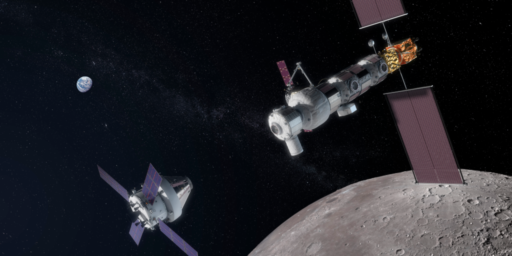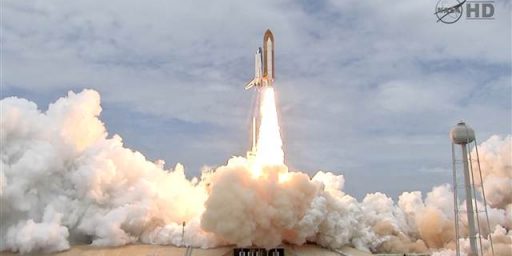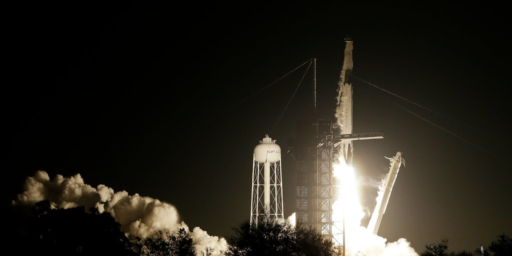KRAUTHAMMER: SPACE GEEK
Charles Krauthammer is a man ahead of his time:
Four years ago, I wrote an article (“On to Mars,” the Weekly Standard, Jan. 31, 2000) advocating phasing out the space shuttle, abandoning the space station, establishing a moon base and then eventually going on to Mars. It was greeted with yawns by those who noticed it at all.
Even my friends excused my fondness for the moon as the kind of eccentricity one expects from a guy who has an interest in prime numbers and once drove to New York to see a chess match.
Well, things have gotten worse. This week, when the president of the United States proposed to phase out the space shuttle, phase down the space station, establish a moon base and then eventually go on to Mars, he was met not with yawns, but with ridicule.
Krauthammer then explains why he and Bush are right, via a cleverly structured false dilemma:
NASA gave us the glory of Apollo, then spent the next three decades twirling around in space in low Earth orbit studying zero-G nausea.
It’s crazy, and it might have gone on forever had it not been for the Columbia tragedy. Columbia made painfully clear what some of us have been saying for years: It is not only pointless to continue orbiting endlessly around the Earth; it is ridiculously expensive and indefensibly risky.
***
Those who want to divert even these paltry sums to domestic spending would undoubtedly have objected to Magellan’s costly plans, too. Look. We can stay on Earth. We can keep tumbling about in orbiting Tinkertoys. Or we can walk the moon again and prepare for Mars. I can’t imagine an easier choice.
So, we can either waste money doing something worthless repeatedly, we can spend much more money doing something of limited value, or take what’s behind Door Number Three?
I still haven’t made up my mind on this one. Krauthammer may be right that, if we cancel the shuttle and devote the entirety of the existing NASA budget to this new adventure, the added cost would be something like 5 percent. I’m naturally skeptical of budget projects made decades out, though. He is almost certainly correct that the scientific gains from such a project would be tremendous. But, then again, one would think that simply spending the same amount of money on focuses R&D–say, cancer research–would yield comparable benefits.
I’d like to hear more about the expected practical benefits of this. Will we finally be getting those flying cars the sci-fi writers have been promising us? One of those cool Star Trek replicators where you can walk up and say “Tea. Earl Grey. Hot.” and get a cup of hot Earl Grey tea? [You mean, like a microwave? -ed. Too slow!] A holodeck? Hot Vulcan chicks in skimpy costumes? I’m still sellable on this one; but I’m far from sold.






I don’t think the President’s plan will cancel the Shuttle per se — a new Shuttle-type craft is in the works along with the rest of this boondoggle.
I’d like to hear more about the expected practical benefits of this.
OK First and foremost can you say energy?
(allow me to digress)
As you know, much of what we as mankind know has come from war.
WWI taught us to (really) fly.
WWII taught us electronics.
Korea and Vietnam mostly brought us advances in medicine. (well that and some political lessons)
(I cold spend more time to flesh out the above but it is off point, just follow me for now, call these the “centerpieces” of wartime progress.)
The same can be said for Apollo. It gave us miniaturization and integration of electronics that all bloggers should appreciate today. Not to mention communication advances.
What will Mars give us? Just as Apollo there will be a bazillion spin offs but I’d guess the centerpiece of the exercise will be energy. It will be impossible to get to Mars without solving some of the energy problems that have vexed us for over a century.
Can you imagine a laptop that needs some energy maintenance once per year? A cell phone (er PDA) that never needs charging because it will be obsolete before its energy supply is expired?
You won’t get that flying car but how about a zero emission electric automobile that can go 1000 miles (at 200mph) between charges and be recharged in 10 minutes? (that you don’t have to drive because it drives itself while you blog 😉
Am I exaggerating? Hardly. If the day after Kennedy’s famous speech I told you where technology would be today thanks in part to a large push from the space program you would have had me locked up. If my predictions prove to be wrong in 50 years it will be because I underestimated what was ahead.
Remember there is a ripple effect to advanced technologies. Or maybe the better analogy is compounded interest. Forget the DIRECT benefit for a second, even though they will be many. If we land by 2030 what will the “compounded interest” in technology will be by 2050?? I’m simply not smart enough to even hazard a guess.
And what is in it for jaded Poli Sci proffs? Consider a new world where he Arabs don’t have oil to sell because we have fixed the energy problem?
Consider a world where energy can bring manufacturing, clean water, cooling and heating to any part of the globe. (affordabally, in days)
Consider a world where bringing a product from one continent to another can be done in hours and cost pennies.
Would it change the world? Do a google news search for “Baghdad electricity” and tell me how importing things like this are today.
Never in the history of mankind have we been harmed by exploration and a quest for knowledge. The luddites against this sound like the infamous head of the patent office that wanted to shut it down in the 1800’s because we had already invented everything.
Maybe you have too much education. You are comfortable with what we know. We are mental children. We know nothing. Hell we don’t even know how we got here! The day we stop exploring we may as well pack it in and go home.
Life simply ain’t worth living.
[Damn I’m wordy, sorry]
OK consider one more point….
I keep hearing this silly argument about the fact we could spend the money better here at home…. What do these people think — that we just go to Mars, drop buckets of money there and come home??? The money IS spend here.
Many of the people against this today were big fans of Bill Clinton’s “jobs” programs. You want a good jobs program? Forget a program that provides childcare to a poor woman in an urban setting. The return on investment helping people at that level sucks. (I know, I’m a heartless conservative… No, I just know how to work a calculator, get over it.)
How about a “jobs program” that will provide a hundred million white collar jobs doing things we have never even dreamed of today? YUP I said 100 million. (By then probably a quarter of the workforce.) That is the kind of impact we will get from the technology boost from this single program.
If you don’t believe that, look at what the space program has done so far. My direct income is owed in large part to the original space race. So is the income of (probably) most of your readers. (or at least a quite significant hunk) The kid selling cell phones at the mall? What would he be doing for a living without the space race?
Giving you a recitation of the “expected practical benefits” is near impossible as none of us has any clue what the future will bring.
But history has taught us the benefits will be incalculable.
Hey. Get your own blog.
😉
Good stuff.
Kate,
It’s a pretty candy ass heartless conservative who wouldn’t just farm out those jobs to India, Actually India is already passé, Columbia is the next hunting ground where the heard of cheap labor grazes for Corp America to hunt.
(I posted this same screed in your post regarding Sullivan’s take on the Mars shot)
You want motivation for this? I forget the exact year, but it was while I was in college. (1988-93) A Near Earth Asteroid about the size of Manhattan passed within about 100,000 miles of Earth, or about half-way between here & Luna. It wasn’t detected until two weeks after it had passed. This thing was big enough to be a dinosaur-killer, and we had no idea it came so close to hitting us until a fortnight after it passed. THAT is why we need to colonize Luna & Mars. And even beyond the confines of our home system, even if we have to use generation ships that melt down Kupier Belt Objects for fuel. The dinosaurs are extinct because they had no space program.
Maybe it’s because I grew up reading Heinlein and Asimov and Bradbury, but I EXPECT us to be exploring/exploiting/settling the other planets. I have been deeply disappointed that the space program has been in sort of a holding pattern.
The space program has brought the world a lot of benefits, even though they may not seem obvious. GPS, for example, can enable us to kill people more accurately and attempt to spare the lives of those we have no quarrel with. (I’m sure the folks targeted would not consider that a benefit, but the spared civilians may appreciate it.)
I agree with Paul that the energy problem will have to be addressed for Mars exploration/moon settlement. The benefits of solving that problem would be incalculable at present. What would be the effects? What would a post internal combusion engine world look like? I dunno, but I’m eager to find out.
Fifteen years ago, I would not have imagined that cell phone technology and computers would have made it possible for lil’ ol’ me to live in Florida and simultaneously work in the northeast every day. I look forward to the next 15 years!
That 5%? it’s of the three billion NASA already has for going back to the Moon and Mars but aren’t using for that.
The last two years increase in the California deficit is a heck of a lot more than needed to at least land on the moon again.
Now, I’m not saying either our Moon or even Mars will have direct benefit – that may have to wait until we get to the asteroid belt. But the indirect benefits are quite literally incalculable. Next time you use Velcro® remember the French inventor couldn’t get anyone to produce it until some unsung dweeb at NASA spotted it and realized it could be used by people wearing spacesuit gloves.
Nice try to pump up your google hits from the phrase “hot vulcan chicks in skimpy costumes”, James :).
—